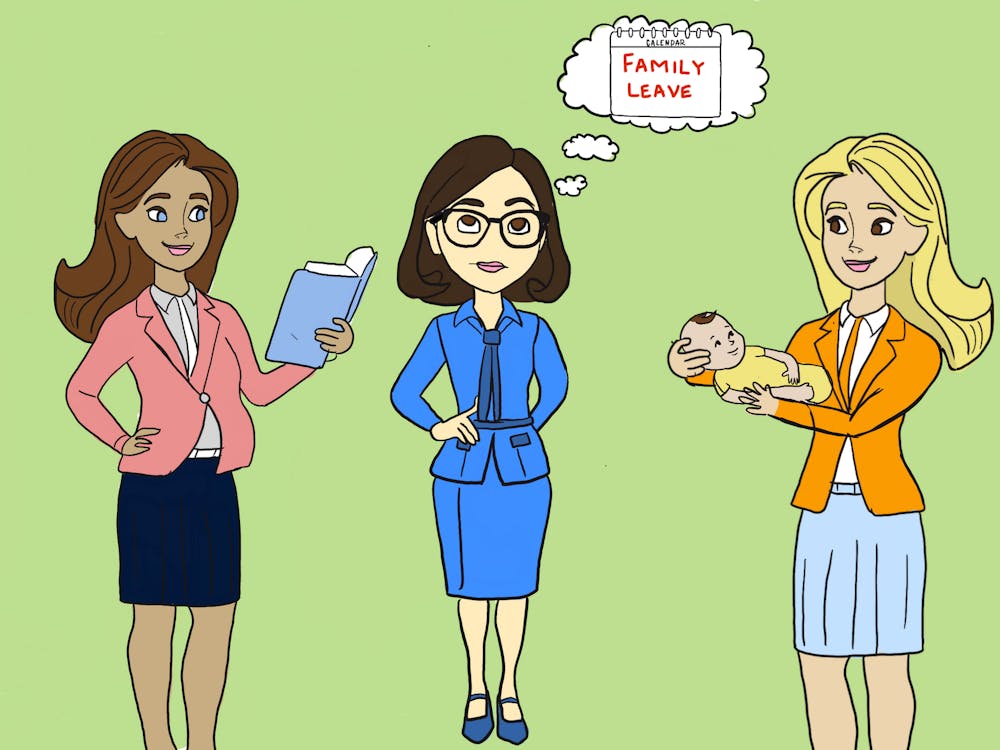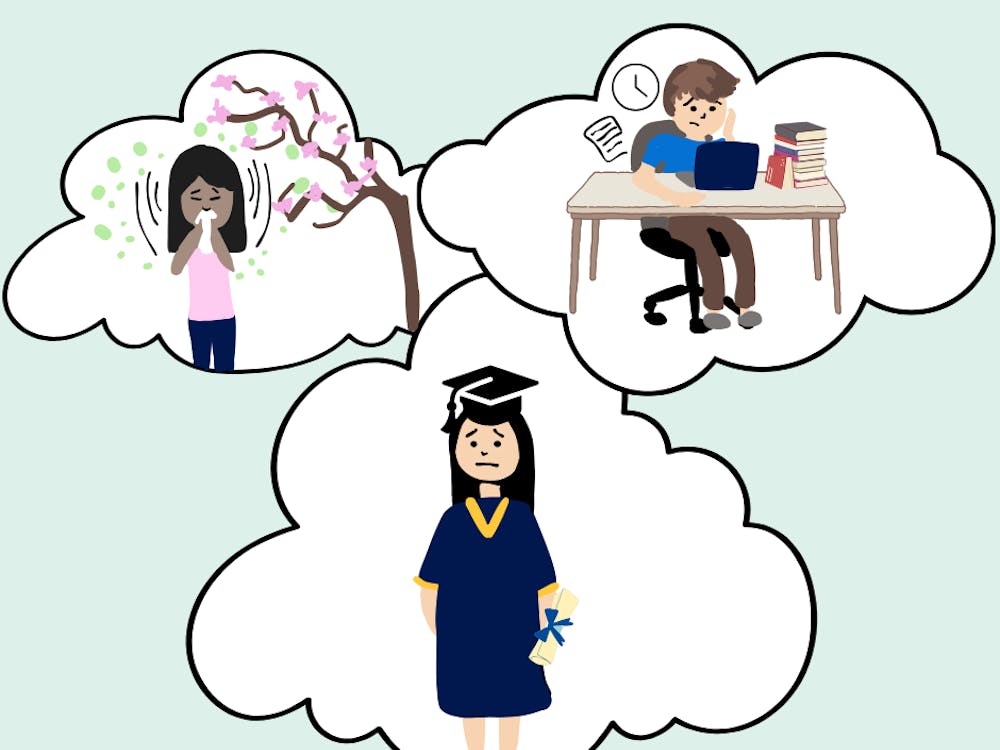Students aren't the only ones taking advantage of their time off from school -- faculty members did it all this summer, from international research to health awareness to influencing public policy. Some even found time to get outside and have some fun.
The world at their feet
University professors ventured all across the globe this summer in order to gain international perspectives and experiences to bring back to their own work at the University.
Several members of the art department traveled to Europe to attend the Documenta art show in Kassel, Germany and the Biennale in Venice, Italy. According to University Art Museum Director Jill Hartz, the shows are considered to be two of the most important contemporary art exhibitions today. She added that the shows were "educational rather than market-driven."
The art faculty spent time sightseeing in both cities in order to observe the many shows nestled in both conventional and unconventional locations. In addition to galleries and museums, artists utilized spaces such as churches and gardens to host their collections.
"You get to explore cities and get to look at art in different contexts," Hartz said. "You kind of have to go all over these locations to see the work you want to. It gets you to know the cities as well as appreciate the work."
After returning to Charlottesville, faculty members plan to apply their newfound knowledge toward future endeavors at the museum.
"We now have the catalogs as documentary evidence and it gives us ideas for works we can acquire for exhibitions or who we want as visiting artists," Hartz added.
While art faculty members spent time in Europe, other professors found themselves in much more unconventional tourist territory. Pursuing research for a book on American perception abroad, Politics Prof. Gerard Alexander spent time in the northern region of war-torn and politically tense Iraq to speak face-to-face with Kurdish government officials. Alexander said his work in Iraq is primarily intended to fill in gaps of information and find honest perspectives.
"One problem lies with basing opinions on op-eds and columnists," Alexander said. "Those who are the most anti-American have very big microphones. Secondly, we rely on surveys and public opinions. That's more scientific then an op-ed, but still doesn't provide everything. My view is that one should do interviews to allow speakers to say and do ... things that they wouldn't regularly."
Alexander said his time spent examining government documents and speaking with officials in high circles not only benefited his own work but also gave Kurdish officials the opportunity to uncover more about their own country's political situation in return.
"They were asking me what I thought was happening south of the Kurdish region -- they are very dependent on CNN like we are," Alexander said. "Much of Iraq they couldn't go to except in our own convoys. The surge was already underway and they were having to rely on friends and rumors to know whether it was going to cause harm or not."
Luckily, Alexander said he encountered few problems while in an area with such a wide level of uncertainty. He plans to return once again in October to continue his research.
While some professors let their work lead them to distant destinations, others utilize the summer break as an opportunity to vacation and explore foreign countries for their own enjoyment.
After a trip to Kenya with a world-renowned explorer last year, Commerce Prof. Thomas Bateman said he spent 11 days with a small party on a nature trek to the same region. In addition to covering over 100 miles of Kenyan landscape, Bateman encountered an abundance of animals ranging from zebras and antelopes to those that are more threatening.
"We had armed guards with us because there were several types of dangerous animals like lions that have a historical reputation of being man-eating lions," Bateman said.
After his adventure in Africa, Bateman took a more relaxing trip to Scotland for hiking and golf with his wife. But, even after his return, he said a part of his heart still remains in Africa.
"The Africa trip this year was inspired by last year; when I came back I couldn't wait to return," Bateman said. "It kind of gets in your blood."
From sea to shining sea
Some University faculty members left a mark on their field without even having to pull out their passports. Education Prof. Margaret Miller said she traveled to Chicago to act as a conference moderator for higher education policy leaders from various Anglophone countries. Discussion focused primarily on university access, affordability and globalization.
Miller said her experience, aside from being educational and refreshing, served as a reminder that many heads are better than just one.
"American leaders maintain that we have a lot to learn which hasn't been the stance American education has always taken since on a number of measures we've always been leaders," Miller said.
Intellectuals from the University also exercised their expertise in the nation's capital. Economics Prof. Kenneth Elzinga sat in as an economic advisor at the Supreme Court on the case of Leegin Creative Leather Products v. PSKS, Inc. The 5-4 decision reversed a precedent set by earlier rulings that stood since 1911. Elzinga's contributions to the case led him to speaking engagements across the country; however, his professional duties did not stop him from enjoying a cruise with his wife.
There's no place like home
The departure of students after finals by no means stopped the Academical Village from continuing to thrive. Those remaining in Charlottesville managed to contribute to the greater community in a variety of ways.
Summer session at the University was a popular option for many students and faculty members. Chinese Language Lecturer Shu-Chen Chen led an intensive elementary Chinese class; in addition to three hours of daily class time, students participated in an hour and a half review session each evening. According to Chen, the class may be difficult but is worth it.
"The education is a more solid foundation," Chen said. "From the intensity, you earn an edge other students wouldn't have. You are able to master a week's worth of material in a day or two."
Yet life in Charlottesville extended outside of the classroom for many. Environmental Sciences Prof. Janet Herman, a breast cancer survivor herself, helped coach women through the Charlottesville Track Club in preparation for a four-miler to support breast cancer research.
"I [had] the opportunity to talk about how I wasn't expecting to be diagnosed with breast cancer," Herman said. "Not only did my degree of fitness help me, but my connection to the women helped me."
Herman said her main goal in participating in weekly Saturday training sessions was to get others fit, but also to create an enjoyable experience.
"This is about us making it fun for them," Herman said. "They aren't thinking about how hot and sweaty they are. We have music, stereo speakers and we give door prizes away every Saturday morning."
From the academic to the athletic, University professors participated in a wide variety of activities over the summer. As they return to Grounds in the coming weeks and begin classes, their experiences will certainly color their teaching and possibly even lead to some interesting tangents in class.






